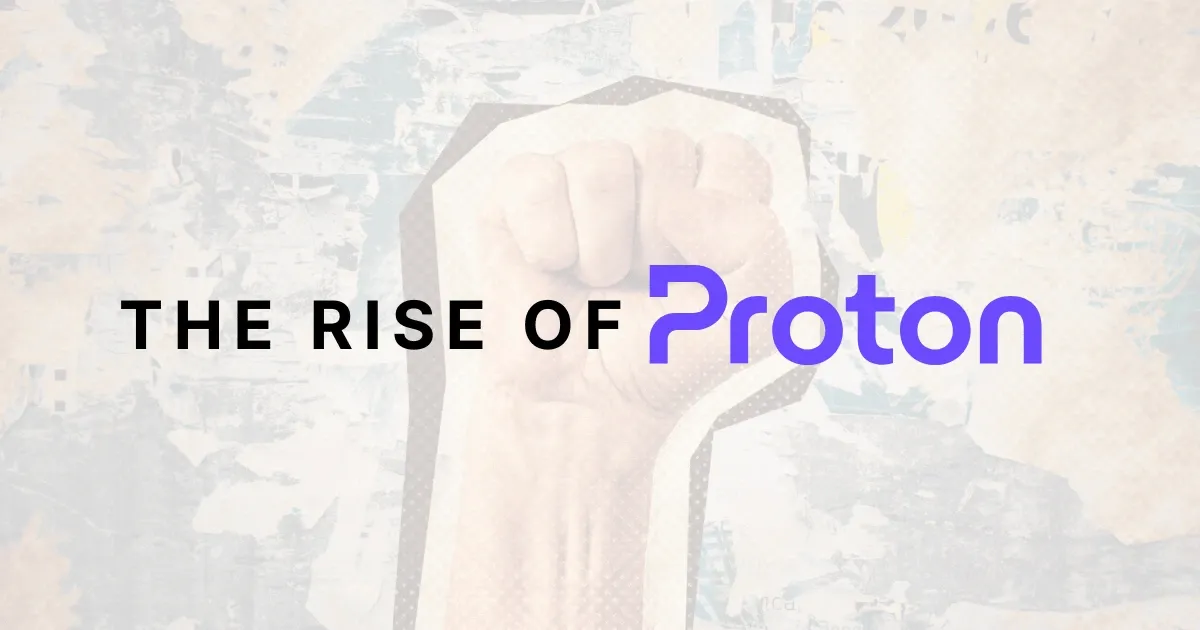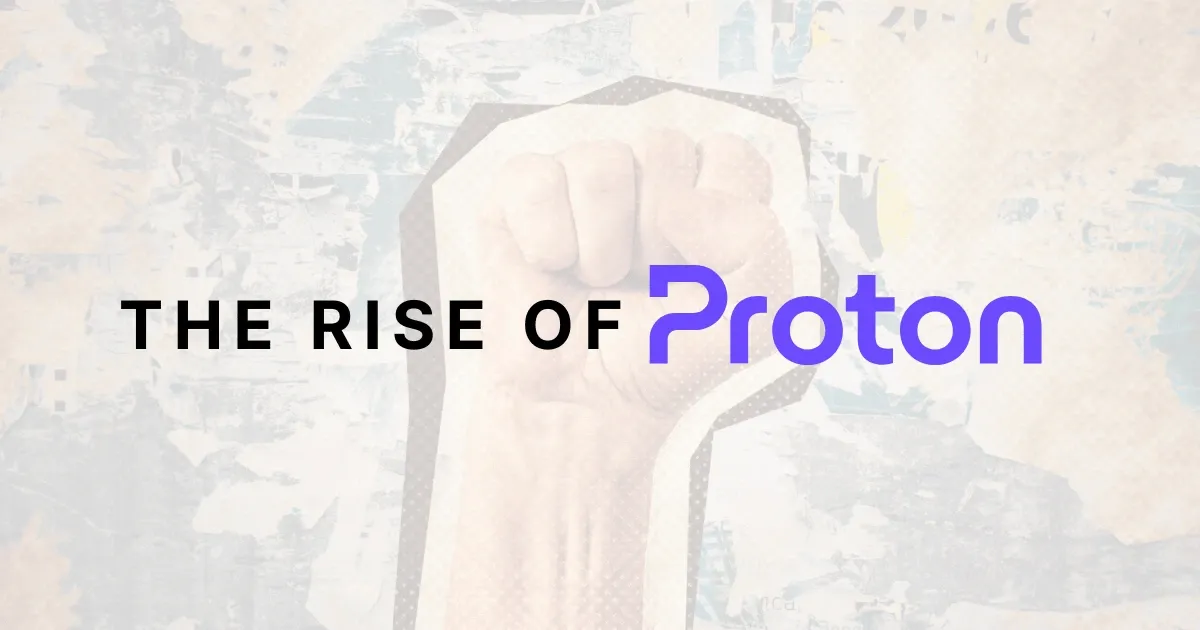The Rise of Proton: A Tech Company You Can Actually Trust
 Jainil Prajapati
Jainil Prajapati

In a world where big tech companies often face criticism for prioritizing profit over privacy and ethics, Proton stands out as a rare breed of tech company focused on privacy, security, and ethical growth. Founded in 2014 by scientists from CERN, ProtonMail has evolved into a full-fledged ecosystem of privacy-focused services, including ProtonVPN, ProtonDrive, ProtonCalendar, ProtonPass, and more. This blog post will delve into the rise of Proton, its importance in the tech landscape, and why it could be the ethical tech company you’ve been looking for.
The Privacy Dilemma of Modern Tech Giants
The tech giants of today, like Google and Microsoft, have built their empires on data. Whether it’s to improve their products or serve more personalized ads, they rely heavily on collecting, storing, and analyzing vast amounts of user information. But this business model has a downside: user privacy is often compromised.
For instance, until 2017, Google’s policy was to scan users' Gmail inboxes for advertising purposes. Microsoft, similarly, has faced scrutiny over its data collection practices. Even if users trust these companies, the sheer volume of data they handle makes them prime targets for cyberattacks and government surveillance.
This is where Proton comes in. In 2013, Edward Snowden revealed the extent of government surveillance, which led to a surge in demand for more secure, encrypted communication tools. ProtonMail was founded to address this gap by providing end-to-end encrypted email, meaning that no one—not even Proton—could read the contents of your emails.
The Evolution of ProtonMail
ProtonMail’s initial success was due to its simplicity and security. Unlike existing encryption tools like PGP, which required users to manually exchange encryption keys, ProtonMail made encryption automatic and seamless. If both parties were using ProtonMail, their communication would be fully encrypted. This ease of use made it accessible to millions, and ProtonMail quickly gained popularity.
However, ProtonMail had a significant limitation: it could only guarantee privacy between ProtonMail users. If you emailed someone using Gmail or another provider, the encryption couldn’t be enforced on their end. This didn’t deter Proton from expanding its services, though. In 2017, the company launched ProtonVPN, and in subsequent years, it added ProtonDrive, ProtonCalendar, and ProtonPass, creating a full privacy-first ecosystem.
The Proton Ecosystem: Privacy Beyond Email
Proton’s vision extends far beyond email encryption. The company aims to provide a complete suite of productivity tools that prioritize user privacy, rivaling Google’s G Suite and Microsoft Office. The Proton ecosystem currently includes:
- ProtonVPN: A secure VPN that doesn’t log your browsing activity, ensuring online privacy even when using public networks.
- ProtonDrive: A cloud storage service with end-to-end encryption, protecting your files from unauthorized access.
- ProtonCalendar: A privacy-focused calendar app, where even your event details are encrypted.
- ProtonPass: A password manager that securely stores your login credentials and can also generate email aliases to protect your identity.
This ecosystem is continuously expanding. Recently, Proton launched ProtonWallet, a cryptocurrency wallet designed to keep your Bitcoin physically on your device rather than on an exchange. Each of these apps works seamlessly together, providing a comprehensive privacy-first alternative to mainstream tech offerings.
Why Proton Is Different
What truly sets Proton apart is its business model and commitment to transparency. Unlike many competitors, Proton isn’t ad-supported. Instead, it relies on paid subscriptions to offer premium features, ensuring that it remains independent and free from the influence of advertisers. This is a rare model in the tech world, where most companies opt for ad revenue at the cost of user privacy.
Moreover, Proton has made its apps open source, allowing anyone to inspect the code and verify that there are no hidden backdoors. This level of transparency builds trust with users and sets a high standard for other privacy-focused tech companies.
Achieving Scale and Competing with Big Tech
While many small tech companies focus on privacy, few have managed to scale as successfully as Proton. With over 100 million users across its numerous services, Proton is no longer a niche player. It’s becoming big enough to matter.
This scale allows Proton to continuously invest in improving its products. In recent months, the company has added real-time collaboration features to ProtonDocs, introduced automatic photo backups for ProtonDrive, and even launched Scribe, an AI-powered document editor that doesn’t compromise user privacy.
The Challenges Ahead
Despite its success, Proton isn’t perfect. The company still lacks certain productivity tools, such as a dedicated spreadsheet or presentation app, which limits its ability to fully replace Google Workspace or Microsoft Office. Additionally, some privacy advocates have raised concerns about Proton’s compliance with legal warrants from Swiss authorities, which has led to a few cases where Proton handed over user metadata to law enforcement.
Proton acknowledges these challenges and is working to address them. For example, it recently established the Proton Foundation to ensure that the company remains mission-driven and independent.
Conclusion: Why You Should Consider Proton
In a world where tech giants routinely sacrifice privacy for profit, Proton is a refreshing alternative. With its privacy-first approach, user-friendly products, and sustainable business model, Proton is proving that you don’t have to compromise on ethics to succeed in the tech world.
Whether you’re concerned about government surveillance, corporate data collection, or simply want better control over your personal information, Proton offers a comprehensive, privacy-focused ecosystem that is worth considering.
If you're interested in exploring Proton services, you can visit their website or check out their free plans to get started. For more tech insights and privacy tips, make sure to follow our blog!
Subscribe to my newsletter
Read articles from Jainil Prajapati directly inside your inbox. Subscribe to the newsletter, and don't miss out.
Written by

Jainil Prajapati
Jainil Prajapati
Too much for someone, just enough for those who matter